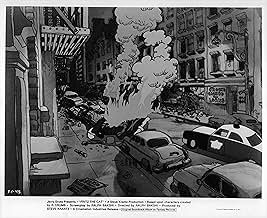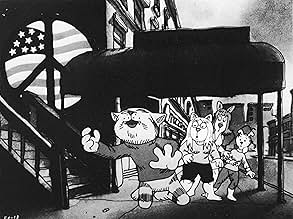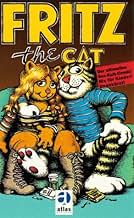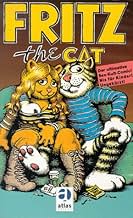VALUTAZIONE IMDb
6,2/10
15.516
LA TUA VALUTAZIONE
Un gatto studente universitario scatena l'inferno in una versione satirica con diversi elementi degli anni '60.Un gatto studente universitario scatena l'inferno in una versione satirica con diversi elementi degli anni '60.Un gatto studente universitario scatena l'inferno in una versione satirica con diversi elementi degli anni '60.
Rosetta LeNoire
- Bertha
- (voce)
- …
John McCurry
- Blue
- (voce)
- …
Judy Engles
- Winston Schwartz
- (voce)
- …
Phil Seuling
- Pig Cop #2
- (voce)
Ralph Bakshi
- Narrator
- (voce)
- (non citato nei titoli originali)
- …
Charles Spidar
- Bar Patron
- (voce)
- (non citato nei titoli originali)
- …
Recensioni in evidenza
I came of age in New York City during the 1960s and shared many of the same trials and tribulations of Fritz the Cat. It's hard to find your kicks when everyone around you is spaced out and hung up on aggression. All us long-hairs got a bad rap, like Fritz, because we were confused about what it is we wanted. For those of us who lived, we began to age to the point of getting knowledge and understanding. Of course by the time we understood that it was too late to do anything about it. The scene was too weird and we were too confused. Fritz the Cat is like a lot of the guys I hung around with; full of ideas and short on ambition. This film is a perfect view of what some people saw in the 1960s. 3 1/2 stars out of 4.
The idea of taking certain concepts to the extreme has been happening forever and it's no stranger to the film industry. Originally, the thought of making animated movies was scoffed at, until Disney made theirs. Then as time progressed, people began to treat animated features with more relevance towards adults. However, it wasn't until the experimental era of rock, fornication and drugs did that particular push come into play. Classic cartoons that came before the 1950s were considered for adults, but they didn't contain blatant drug abuse and graphic sexual content. That is until Ralph Bakshi became one of those pioneers of said genre. Having worked on several other animated projects prior, Bakshi was very familiar with this aspect of filmmaking, which led him to his feature film directorial debut.
Fritz the Cat (1972) is Bakshi's satirical take and social commentary on the 1960's in the United States. Plot wise, it follows the adventures of Fritz the cat (Skip Hinnant) looking to fine the "inner meaning" to life and such. Being a college student, he floats around hopping to different places and experiencing different kinds of people with their ideologies. Also written by Bakshi, the script finds itself bogged down with a hodgepodge of events and underdeveloped motives for the audiences' "protagonist". It's rather unfortunate because the film itself isn't meant to really make Fritz a likable character, but the film also partially fails to provide any sort of understanding as to why he acts the way he acts. It's just Fritz being hypocritical doing things with different people; which was already spoiled in the plot synopsis.
In a way, it feels like Bakshi's version of Alice in Wonderland but grittier and graphic. The audience bumbles along with Fritz on his misadventures watching him try to fit in with all sorts of individuals that in no way fit him. Worst yet, is that Fritz himself feels weightless in his motivations. He just keeps searching, and searching, not really getting to a definitive state of understanding. Fritz is a lost puppy....how oxymoronic. Along his travels, Fritz tries drugs, fornicates with whatever character he finds appealing that he can woo over, joins extremely dangerous cults and causes tensions between different groups of people. All to find that "inner meaning" he so desperately wants to understand. In some ways, it feels like what some of the 1960s were about, but was it that chaotic and scatterbrained?
The acting is fine despite the cast being a very short list. Skip Hinnant as Fritz is fine, he gets the job done adequately. He didn't perform very much after this, returning for The Nine Lives of Fritz the Cat (1974) and I Go Pogo (1980). Rosetta LeNoire also plays the role of Bertha in this film. She does fine for the role while also voicing other characters too. LeNoire would later have roles in The Brother from Another Planet (1984), Gimme a Break! and Family Matters. There are some other actors involved in this production, but their contribution is so little in comparison and they didn't go on to do much later, so it's not worth covering. If there's one thing Bakshi got right, it was making this cartoon directed towards adults because no youth should see the amount of graphic nudity and violence that is in this picture. There's blood, private parts and racial undertones that would not be accepted at all today by any means.
As for the visual aspects, it's a little confusing as to why two cinematographers were needed as this was an animated film. There are some settings where the picture gets rotated but I'm not sure if camerawork was needed for that. As for the animation itself, the colors and movements to the characters are good. The textures to the animation are unique too since it was most likely cell animation. The coloring in every stage of the animation looks like no frame was filled in exactly the same. It's a different look for sure. Lastly the music composed by Ed Bogas was okay for the time and budget it was produced on. Bogas would also go on to compose for The Charlie Brown and Snoopy Show and Garfield and Friends. He would also go onto compose music for video games like Gameboy's Swamp Thing and even the dreaded NES Action 52 cartridge. Very interesting indeed.
As a whole, the movie should be looked at more as a trial in pushing the limits of acceptable animated films. Sadly, this movie tries to make a point but doesn't. The animation, music, social commentary and acting are okay, but the point of it is lost with its haphazard story, overly graphic detail and half-baked script.
Fritz the Cat (1972) is Bakshi's satirical take and social commentary on the 1960's in the United States. Plot wise, it follows the adventures of Fritz the cat (Skip Hinnant) looking to fine the "inner meaning" to life and such. Being a college student, he floats around hopping to different places and experiencing different kinds of people with their ideologies. Also written by Bakshi, the script finds itself bogged down with a hodgepodge of events and underdeveloped motives for the audiences' "protagonist". It's rather unfortunate because the film itself isn't meant to really make Fritz a likable character, but the film also partially fails to provide any sort of understanding as to why he acts the way he acts. It's just Fritz being hypocritical doing things with different people; which was already spoiled in the plot synopsis.
In a way, it feels like Bakshi's version of Alice in Wonderland but grittier and graphic. The audience bumbles along with Fritz on his misadventures watching him try to fit in with all sorts of individuals that in no way fit him. Worst yet, is that Fritz himself feels weightless in his motivations. He just keeps searching, and searching, not really getting to a definitive state of understanding. Fritz is a lost puppy....how oxymoronic. Along his travels, Fritz tries drugs, fornicates with whatever character he finds appealing that he can woo over, joins extremely dangerous cults and causes tensions between different groups of people. All to find that "inner meaning" he so desperately wants to understand. In some ways, it feels like what some of the 1960s were about, but was it that chaotic and scatterbrained?
The acting is fine despite the cast being a very short list. Skip Hinnant as Fritz is fine, he gets the job done adequately. He didn't perform very much after this, returning for The Nine Lives of Fritz the Cat (1974) and I Go Pogo (1980). Rosetta LeNoire also plays the role of Bertha in this film. She does fine for the role while also voicing other characters too. LeNoire would later have roles in The Brother from Another Planet (1984), Gimme a Break! and Family Matters. There are some other actors involved in this production, but their contribution is so little in comparison and they didn't go on to do much later, so it's not worth covering. If there's one thing Bakshi got right, it was making this cartoon directed towards adults because no youth should see the amount of graphic nudity and violence that is in this picture. There's blood, private parts and racial undertones that would not be accepted at all today by any means.
As for the visual aspects, it's a little confusing as to why two cinematographers were needed as this was an animated film. There are some settings where the picture gets rotated but I'm not sure if camerawork was needed for that. As for the animation itself, the colors and movements to the characters are good. The textures to the animation are unique too since it was most likely cell animation. The coloring in every stage of the animation looks like no frame was filled in exactly the same. It's a different look for sure. Lastly the music composed by Ed Bogas was okay for the time and budget it was produced on. Bogas would also go on to compose for The Charlie Brown and Snoopy Show and Garfield and Friends. He would also go onto compose music for video games like Gameboy's Swamp Thing and even the dreaded NES Action 52 cartridge. Very interesting indeed.
As a whole, the movie should be looked at more as a trial in pushing the limits of acceptable animated films. Sadly, this movie tries to make a point but doesn't. The animation, music, social commentary and acting are okay, but the point of it is lost with its haphazard story, overly graphic detail and half-baked script.
Anyone who didn't like Fritz the Cat is not looking at the film in the right way. A lot of the reviews I've read basically said that it is nothing more than a bad film that strives only on shock value to get an audience. I also read that it doesn't have much of a storyline and only revolves around sex and drugs......so what else did you expect a movie about the slackers of the 60s to have? Did the stoners of that decade NOT behave the way Fritz does in the movie? In order to understand the point of the movie you have to put yourself into Fritz's shoes and let him guide you through his life as a college drop-out trying to find his purpose (Existentialism for those who are not familiar with philosophy) in life and still have a good time. Of course his journey leads you to animal orgies and a crow that hides pot in awkward places, but that is the beauty of this movie--it's about freedom! I also do not believe it is outdated because Fritz's trippy surroundings and his pseudo-intellectual thoughts were enough to make me melt! It's all about the mood. The animation and music put the viewer in a hypnotic state where nothing else matters except pleasure and happiness. If you can't identify with Fritz then you have lost the feel of what it's like being young.
And just for some peoples' info. the movie is not X-rated because it has explicit sex scenes (any viewer of pornography, also X-rated in some form, knows that we have seen much more of the human body then is depicted in this film), it is X-rated because there are CARTOON ANIMALS HAVING SEX. Anyone who would give this film an R-rating because there are no close-ups should not plan on an MPAA career in the near future
And just for some peoples' info. the movie is not X-rated because it has explicit sex scenes (any viewer of pornography, also X-rated in some form, knows that we have seen much more of the human body then is depicted in this film), it is X-rated because there are CARTOON ANIMALS HAVING SEX. Anyone who would give this film an R-rating because there are no close-ups should not plan on an MPAA career in the near future
The story concerns a classic 60's hero, Fritz, and his adventures through the urban underground
He loves sex and constantly claims and declares the glories of revolution
At first he is happy with just sex, but as the story moves through exotic adventures he discovers that the only way he can truly be a revolutionary is to join up with one of the militant groups
There, he's over his head
In sharp contrast to Walt Disney's soft characters, Fritz is seen providing a bunch of screaming female cats, placing drugs, and having lots of fun We are taken through Harlem where, in this case, the blacks are portrayed as jive-talking crows Fritz is not a fantasy, but an animation venture into super-reality, at least as Bakshi sees it
The animation is unpolished, graceless, but very effective It has an unrefined or unfinished, renewable energy that brings out some of the social results of the confused sixties
In sharp contrast to Walt Disney's soft characters, Fritz is seen providing a bunch of screaming female cats, placing drugs, and having lots of fun We are taken through Harlem where, in this case, the blacks are portrayed as jive-talking crows Fritz is not a fantasy, but an animation venture into super-reality, at least as Bakshi sees it
The animation is unpolished, graceless, but very effective It has an unrefined or unfinished, renewable energy that brings out some of the social results of the confused sixties
I'm not particularly a cartoon-fan. I saw " Fritz the cat" in an obscure movie theatre in Ghent (Belgium)in the early seventies. There were about 5 people in the theatre and 2 left after half an hour.
I enjoyed the story: it's about a young guy who discovers the "real" world with all his odd aspects, as the situation was in the late sixties.
The music in this film is super: I discovered the great Charles Earland (Black talk), Duke's Theme from Ray Shanklin, Mamblues (Cal Tjader), Bertha's theme (Ray Shanklin) and even Billy Holiday 's wonderful "yesterdays".
Those who believe there are racist tendencies in the movie don't dig anything about "Jewish" humour.
After having watched this movie, I left the cinema with the conviction:" Hey, in fact I am Fritz the cat ", and believe me, at that time, I was!
I enjoyed the story: it's about a young guy who discovers the "real" world with all his odd aspects, as the situation was in the late sixties.
The music in this film is super: I discovered the great Charles Earland (Black talk), Duke's Theme from Ray Shanklin, Mamblues (Cal Tjader), Bertha's theme (Ray Shanklin) and even Billy Holiday 's wonderful "yesterdays".
Those who believe there are racist tendencies in the movie don't dig anything about "Jewish" humour.
After having watched this movie, I left the cinema with the conviction:" Hey, in fact I am Fritz the cat ", and believe me, at that time, I was!
Lo sapevi?
- QuizThere is no evidence that Robert Crumb filed suit to have his name removed from the film's credits. Contradictory to this claim, Crumb's name continues to appear in the credits, even on home media releases. His name, however, does not appear in the credits for Le 9 vite di Fritz il gatto (1974).
- BlooperWhen he emerges from the trash can, Fritz's outfit changes color from red to blue to red again between shots.
- Versioni alternativeWhen aired during the Groundbreakers block on Playboy, the scene of Harriet's rape is heavily edited. The movie is otherwise uncut.
- ConnessioniFeatured in Precious Images (1986)
I più visti
Accedi per valutare e creare un elenco di titoli salvati per ottenere consigli personalizzati
- How long is Fritz the Cat?Powered by Alexa
Dettagli
- Data di uscita
- Paese di origine
- Sito ufficiale
- Lingue
- Celebre anche come
- Fritz Il Gatto - Il Ritorno Del Pornogatto
- Aziende produttrici
- Vedi altri crediti dell’azienda su IMDbPro
Botteghino
- Budget
- 700.000 USD (previsto)
- Tempo di esecuzione
- 1h 18min(78 min)
- Colore
Contribuisci a questa pagina
Suggerisci una modifica o aggiungi i contenuti mancanti

























